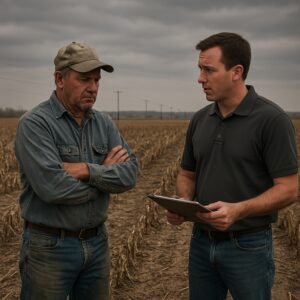It’s not the end of the world
The regional sales meeting was coming up in three weeks and I was trying to figure out how I could somehow contract some kind of 3-day disease to allow me to skip the meeting. Don’t get me wrong, I enjoyed these meetings and got a lot out of them. However, I had one problem, which began several years earlier.
My first four years were great. My results year over year always improved. Sometimes even doubling. The territory was new when I started and success had come as a result of a lot of cooperation amongst departments, new products and hitting the market just right. The growth curve was a steep climb.
So, what was going on now? And why didn’t I want to attend the sales meeting? My first decrease! Not only was this the first time I had a sales decrease, I was lucky enough to have won our top sales award, President’s Club a second year in a row. After four consecutive years of increase, I was awarded this great honor at our national sales meeting: a lifetime achievement. Now, there I was, six months later, at our first regional sales meeting since winning the award. I would be recognized for this great honor. Good, right? No! not good. Because right after everyone got done clapping for those of us lucky enough to win this great honor, our manager was going to put up the current results.
I knew I had a decrease. I knew my name would be in the bottom third. And. With only two weeks before that meeting, I couldn’t change that.
If you haven’t had this experience yet and your sales trajectory is still increasing, that’s great. But, just in case, you slip over the edge and tumble into a decrease, read on for some ways to handle it both from an activity standpoint and from a mental standpoint.
Mental toughness first. Unless you invented the internet or Facebook, you are going to have a decrease at some point, especially in agribusiness. This is a cyclical and seasonal business. Our end users go through boom-bust moments over our 40-year career. The boom times will feel incredible. The bust times can feel horrible but eventually turn back around. Mental toughness or resilience is critical to making it through these times. However, that doesn’t mean you persist no matter what. It means you work on being resilient. To be resilient means you learn from the past and apply that knowledge to the current situation. Following the downturn in the 80’s, debt and land values were much more scrutinized in supplier credit terms. Following the downturn in hogs in the late 90’s, the industry changed and vendors that serve that market restructured their sales approach.
You need to do the same thing as you work through your decrease. You have a very important decision. Unfortunately, you won’t know if it’s the right decision until hindsight tells you it was right. The decision you need to make is how big and how long will this decrease continue. In my case, I got a little too big too fast in my fourth year and lost some medium size accounts. For some of my peers that went through decreases on the dairy or hog side of the business, it was an actual industry change. Customers were buying less from dealers or reducing feeding rates on processed feed. These were different decreases than what I went through. These decreases required the salesperson and our company to make changes to continue to service the hog and dairy industry. For myself, I needed to make changes to how I organized my time, who I prospected and where I focused my efforts.
Ideas when going through a decrease in your territory:
- Blocking & Tackling: personally, the term bothers me because it’s usually someone saying it that never went through blocking and tackling. However, it’s true.
You need to get back to the basics. Those basics that made you great in the first place:
- Pre-call planning
- Doing your homework on prospects & customers,
- Asking good questions (preparing those questions ahead of time)
- Closing 100% of the time
- An unbelievable stamina for following up
When I say Closing 100% of the time, I mean asking a closing question 100% of the time. It doesn’t mean getting a sale 100% of time. However, you need to ask. It’s an absolute must on every call. Even if the Closing question only gets you to the next step in their buying process.
- Get organized: Know who your top customers are and what your expectations are for them. Hint: these expectations are better when they exceed the customer’s expectations. Review your prospect funnel. If it looks like a mess, slash your way through it and refresh it. Nothing kills prospecting efforts more than staring at a list of names you haven’t made progress on in months. Clear the clutter and get some new prospects so you can feel excited about calling on them.
- Go back to some old prospects: Just the opposite of what I just told you? Not exactly. This is your cold case files. You may have a file or list of prospects that you worked on for a while and then things just cooled off to the point you stopped trying. No harm in that as it seemed like it wasn’t a fit. Here’s the great news on this situation. First, things change. Maybe there’s a new manager in there now. Maybe their business went through a major change, a merger, an acquisition. It’s worth a call or a visit to check back in. Besides, it’s not a cold call. This is a person that you talked with in the past. Here’s the second piece of great news. Companies have a way of making their customers mad and want to switch (unfortunately, so does yours). If you haven’t been to see this prospect in a while, check in. They may have become disillusioned with their current supplier and are open to more discussions on what you have to offer.
- Plant the seeds of increase: You’re in Ag. So, you should understand this concept. It may take six months to a year or more before a prospect makes a switch to you, or a customer buys a new product line from you. Unless you hit the timing just right, farmers and ag retailers typically don’t switch on the first sales call. It takes time. If they do, be cautious as they probably will switch to someone else when there’s a better price or shinier toy.
This concept of planting the seeds for an increase causes many salespeople a problem. Why? Because they don’t see the direct correlation of effort to results. For example, you go out and work hard at prospecting for a few months. Nothing happens. The prospects are, “thinking about it”. You quit prospecting because you feel it hasn’t generated any results. So, you go back to working with current customers. After all, they buy from you and appreciate your efforts. Then, after four months, a few of those prospects call you up and want to “talk” when you are able to stop by. Wow, you think. “I’m better off not going out to see them.” That’s bad thinking and leads salespeople towards bad habits. Keep prospecting, even when you feel it’s not making progress. Keep up with your top prospects – not by nagging – but by staying relevant. Know what is going on in their industry and their particular farm or business. Provide value, knowledge, and connectivity around those current issues. Then, when the time is right, they will think of you first.
Back to me at the regional sales meeting, trying to keep as low a profile as I could. The big day came. As nervous as I was about it, I survived. Those of us lucky enough to win the award were recognized and applauded. Then the current results were posted. There I was, solidly in the middle of the bottom third. I guess that’s better than the bottom of the bottom third. But, hey, I had been there also. Just four short years prior, at my very first regional sales meeting, I was on the charts in the dead last spot.
Knowing that I had the ability to go from last to first, boosted my confidence as did the support of my peers. At our social hour that night, following a few jokes about a decrease, the conversation turned very positive and reinforcing. My peers, managers and even our VP wanted to know that I was doing ok and how I planned to get back to an increase. They knew this might be a defining moment for a salesperson. Will the decrease demoralize me into a downward spiral and quit? Or, would I be resilient enough to make a comeback?
For more Ag Sales Training, Ag Sales Coaching and Leading Ag Sales Teams, go to http://www.GregMartinelli.net/




